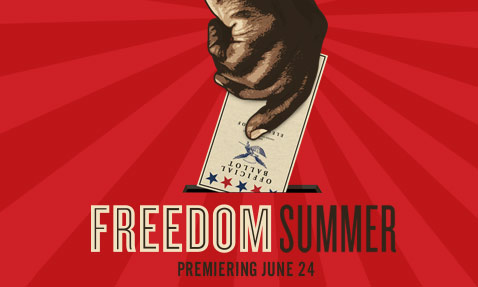
“I don’t think people understand how violent Mississippi was.”
PBS’s new documentary, Freedom Summer, which debuted June 24, begins with this foreboding statement that proves itself true by the end of the film. And what is perhaps most shocking about that violence is that it happened in the not so distant past. Written, produced, and directed by Stanley Nelson, Freedom Summer chronicles the titular 10-weeks of 1964 during which college students from across the country traveled to Mississippi to battle the existing racism that was preventing African Americans from exercising their right to vote. The documentary covers the summer from the first days of the college student volunteers to the formation of the Mississippi Freedom Democratic Party that went to challenge the all-white delegation at the Democratic National Convention, and to the Voting Rights Act of 1965 that actually began during Freedom Summer.
Volunteers and Student Nonviolent Coordinating Committee (SNCC) staff from that summer share life-changing experiences in the film, some for the very first time. Linda Wetmore Halpern recalls being assaulted by a group of white men in a car while she was walking down a road. She recalled, “They started calling me ‘Hey, nigger lover! We got you. We finally got you. We ain’t killed ourselves a white girl yet. You’re going to be the first.'” The men then put a noose around her neck as they drove off in the car holding the other end, making her walk faster and faster until they finally dropped the other end of the rope. “And I just stood there. Because we had to wear skirts. We weren’t allowed to wear pants in those days, so we all had our little shifts on and everything. I peed all over myself. Just stood and just peed,” Halpern said.
While women involved with Freedom Summer were not always treated fairly, Stanley Nelson highlights two important women in his film: Fannie Lou Hamer, a leader of Freedom Summer and the Mississippi Freedom Democratic Party, and Rita Schwerner, who was key in driving the search for three missing civil rights workers, including her husband. The press would hound Schwerner, hoping “that they would catch her at the moment of her widowhood [and see her cry], but she wouldn’t play.” The film highlights Hamer’s powerful testimony at the Democratic National Convention of 1964: “Is this America? The land of the free and the home of the brave? Where we have to sleep with our telephones off of the hook. Because our lives be threatened daily. Because we want to live as decent human beings in America.”
Civil rights leader Bob Moses, featured in the film, reflects on Hamer’s influence on Freedom Summer and at the Democratic National Convention: “She had Mississippi in her bones. Martin Luther King, or the SNCC field secretaries, they couldn’t do what Fannie Lou Hamer did. They couldn’t be a sharecropper and express what it meant, right, and that’s what Fannie Lou Hamer did.”
The Freedom Summer documentary can be viewed on PBS or at the PBS website. NewSouth Books has published the following titles on Freedom Summer for those interested in learning more:
• The Freedom Rides and Alabama: A Guide to Key Events and Places, Context, and Impact — Author Noelle Matteson recounts the events of the 1961 group of interracial riders and their experiences in Alabama from their arrival in Montgomery to the firebombing of their bus in Anniston.
• The Wrong Side of Murder Creek: A White Southerner in the Freedom Movement — The biography of Bob Zellner, the first white field secretary of SNCC, chronicling his experiences as a white Alabamian rejecting the Southern “way of life” he was raised on in pursuit of social change.
• The Children Bob Moses Led — William Heath brings history to life in his fictionalized account of the Freedom Summer through the voices of real-life, legendary leader Bob Moses and a white volunteer college student.
• Sing for Freedom: The Story of the Civil Rights Movement Through Its Songs — Two classic collections of freedom songs (We Shall Overcome [1963] and Freedom is a Constant Struggle [1968]) are reprinted in a single edition to guide the reader through the history and experience of the Civil Rights Movement with sheet music for the songs, important documentary photos, and firsthand accounts by participants in the movement.
All of these titles are available from NewSouth Books or your favorite bookstore.
